Chamber music turns old landmarks into vibrant venues in Sierra Madre and South L.A.

- Share via
Summer is the season when chamber music, that most intimate of musical genres, meets the great outdoors. At America’s destination festivals, you can find chambers by sea (La Jolla SummerFest), in the desert (Santa Fe Chamber Music Festival), on Montana mountains (Tippet Rise Art Center) and in verdant Vermont (Marlboro Music Festival).
Los Angeles thinks differently. We’re a town with a remarkable chamber music history, having produced a wealth of string quartets and other ensembles, but like so much else in L.A., our chamber music tends to be where you least expect it.
Last weekend that happened to be in two vastly different historic rooms built more than a century ago and featuring vastly different music. But they had one thing in common: a connection with Hollywood, far-flung and proximate.
At the Doheny Mansion — the 1899 French Gothic, Moorish, California mission mishmash home of oil tycoon Edward L. Doheny in L.A.’s University Park neighborhood — the New Hollywood String Quartet presented its annual four-day festival of chamber music, this year devoted to Czech composers. Saturday afternoon there was lavish, lush Dvorák, Smetana and Martinu under the Tiffany glass dome in the Gilded Age splendor of the Pompeian Room, complimentary champagne included.
Sunday afternoon, at Sierra Madre Playhouse, which was built in 1910, Tesserae Baroque presented a program amenable to 17th century period instruments, a booming modern baritone saxophone and a present-day clarinet neighing like a Persian ney.

What’s Hollywood got to do with any of this?
For starters, the New Hollywood String Quartet takes its inspiration from the famed Hollywood String Quartet, composed of studio musicians in the 1940s and ’50s. It had the reputation as America’s finest string quartet for its superbly silky sound and capacity for vivid drama. Its unerringly sublime Schubert and penetrating late-Beethoven recordings remind us that the golden era of soundtracks is owed in large part to such studio musicians.
That’s still true with the New Hollywood, formed in 2001, four decades after the original Hollywood quartet disbanded. It takes some doing to find their names as credits in tiny fonts speed by, but they’re in dozens of films you’ve seen.
They also are found around town. Andrew Shulman is the principal cellist of Los Angeles Chamber Orchestra, and first violinist Tereza Stanislav is the second violinist of the Calder Quartet. Violinist Rafael Rishik and violist Robert Brophy are the other versatile, much-traveled members.
A seismic shift in San Francisco’s classical music mirrors change afoot in L.A. With leadership turnover, could existential changes alter the city’s cultural life?
Saturday’s program, which began with Shulman’s forceful performance of Martinu’s 1939 First Cello Sonata, written in Paris as war was breaking out, ended with Smetana’s autobiographical First String Quartet, “From My Life.” Written in 1876, “From My Life” is perhaps the first proto-Hollywood chamber music score, dramatizing Smetana’s onslaught of deafness, with flashbacks of youthful frolicking and lovemaking. The New Hollywood gave it a fleshy immediacy that, in the vibrant space, overwhelmed.
(Yes, the quartet did finds its way onto the silver screen, in the weirdly prescient 1992 heist film “Sneakers,” starring Robert Redford.)
A mile away at USC (where Doheny donated the funds to build the campus’ lovely library), the School of Music faculty once included the likes of violinist Eudice Shapiro, who held sway in the violin department for half a century when she wasn’t serving as the first woman concertmaster of a film studio orchestra at RKO and Paramount or hobnobbing with Stravinsky. She was one of the composer’s favorite violinists.
But the violinist Stravinsky most relied on in L.A. was Sol Babitz, who played in the Los Angeles Philharmonic in the 1930s and with the 20th Century Fox studio orchestra in the 1940s. In the 1950s, he introduced all kinds of modern music to L.A. at the Monday Evening Concerts and Ojai Music Festival. Babitz was also, to Stravinsky’s entranced interest, a pioneer in the early-music performance practice, making L.A. internationally ahead of the game experimenting with period instruments with his Early Music Laboratory. It should not come as a surprise that, growing up in this kind of household, his daughter, writer Eve Babitz, captured L.A. with incomparable verve.
It would be fascinating to know what Stravinsky (who presented a 13-year-old Eve Babitz with her first glass of Scotch) might have thought of “Bowling, Animals, and the Ocean,” the title of the Tesserae Baroque program put together by violinist and violist Andrew McIntosh. McIntosh is a next-generation Babitz and then some. Baroque specialist is a sideline for the violinist and violist, who is also a member of the ultraprogressive chamber orchestra Wild Up and composer of the opera “Bonnie and Clyde.”
Yuval Sharon’s ‘The Comet / Poppea’ is as an experimental dialogue with history in a way that only opera, with its capacity to worm its way inside the minds of characters, might attempt.
In Sierra Madre, McIntosh was joined by two members of Tesserae, Ian Pritchard on a fortepiano and Joshua Rubin, who played both historic and modern clarinets. Rubin, like McIntosh, is also a member of a stellar new-music band, New York’s International Contemporary Ensemble. Along with two movements from a C.P.E. Bach violin sonata and Mozart’s Clarinet Trio (“Kegelstatt”), Rubin was featured in four recent, clarinet-centric short works.
Where a century-old movie theater in Sierra Madre came in is another story. Originally a furniture store, the building was converted to a silent-movie theater in 1924. Eventually it was downsized to a 99-seat playhouse, although it continued to show movies. After the pandemic, it was turned into a small performing arts center. Its new artistic director is Matt Cook, a prominent L.A. percussionist who also is a member of Wild Up.
The programming is ambitious, with plans for new music (Wild Up moves in for a series next season), early music, world music, jazz, pop, dance, theater, silent film (with live music) and more.
If the Tesserae program is any indication, sleepy Sierra Madre may be sleepy no more. The acoustics are ideal. Parking is free and easy in the center of a small downtown with a fine variety of restaurants. The mountains might invite on a less hot day.

But mainly Sunday offered a gripping exploration of what instruments can do when limits are stretched, what composers can do when genres are stretched and what virtuosos can do when techniques are stretched. The sound of gut strings on McIntosh’s violin played without vibrato, for instance, had the florescence that Stravinsky so enjoyed in the Bach sonata. The playhouse ambience fit Mozart’s operatic trio, as it did especially Rubin’s clarinet oddities.
Nina Barzegar’s “Emancipation Pondering” pondered what it would be like if the clarinet could keen and ululate like the Persian ney (it can and boldly did). McIntosh’s “Uncertainty and Discreteness” offered a solo bass clarinet the certainty of sounding submerged. For Michael Finnissy’s “Yso,” Rubin, McIntosh, Pritchard and guest saxophonist Marta Tiesenga were tasked with making interesting an improvisatory piece limited to 100 notes. Rubin and Tiesenga also theatrically paired the similar but different bass clarinet and baritone sax.
On the way out, the president of the board charmingly handed out jars of local marmalade to anyone who made a $20 donation to the playhouse. I had a $20 bill in my wallet and felt well rewarded in more ways than one.
More to Read
The biggest entertainment stories
Get our big stories about Hollywood, film, television, music, arts, culture and more right in your inbox as soon as they publish.
You may occasionally receive promotional content from the Los Angeles Times.













